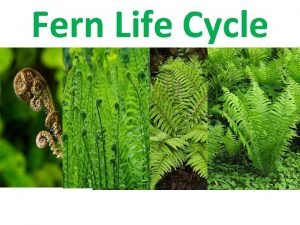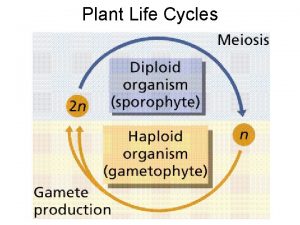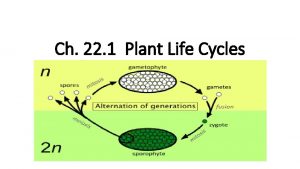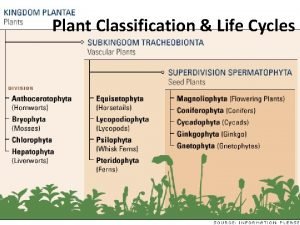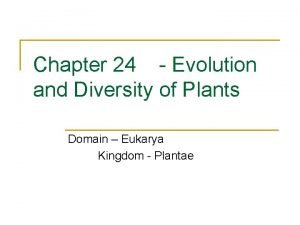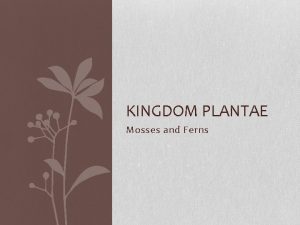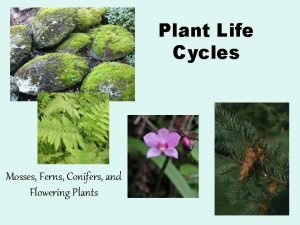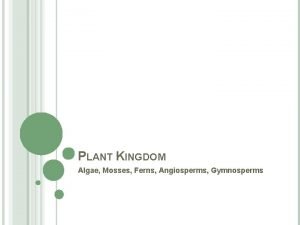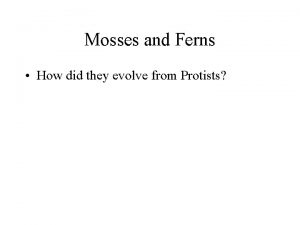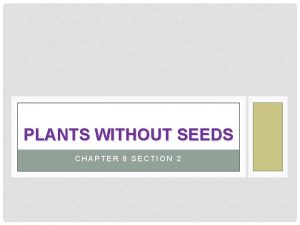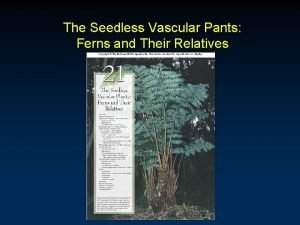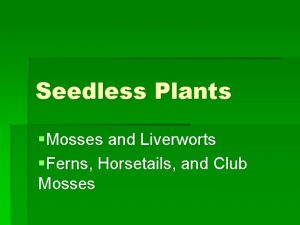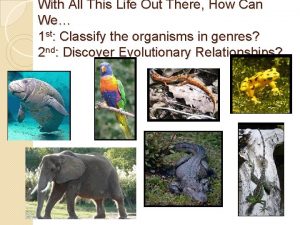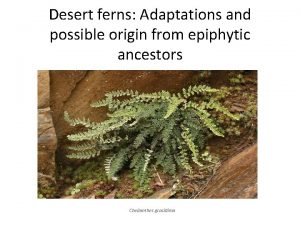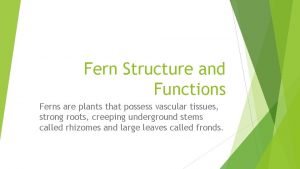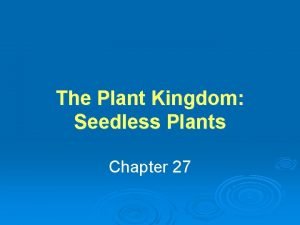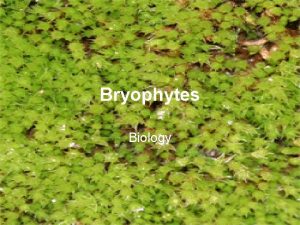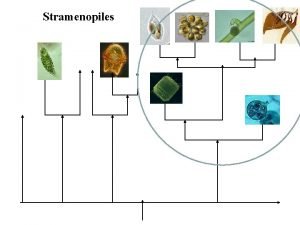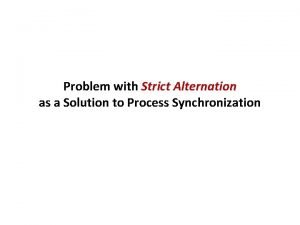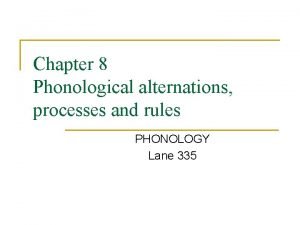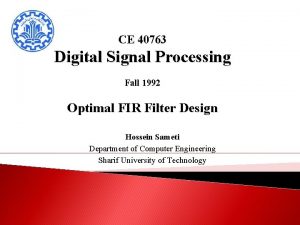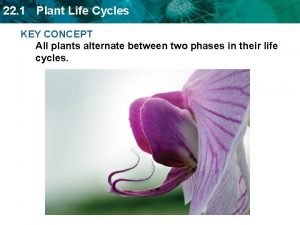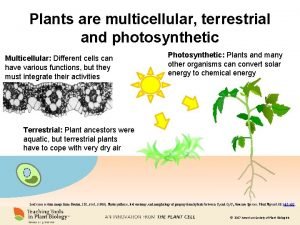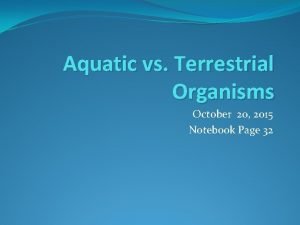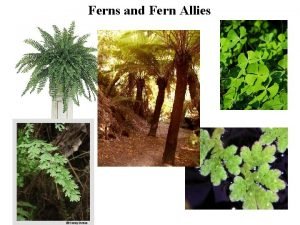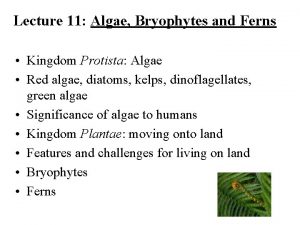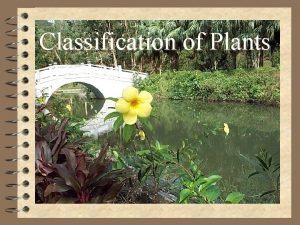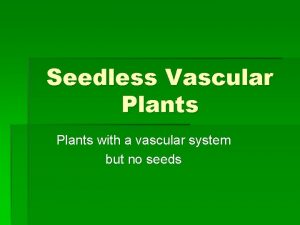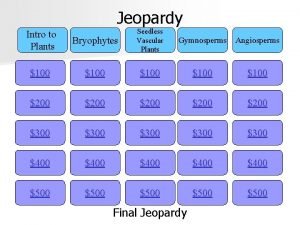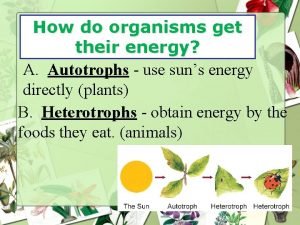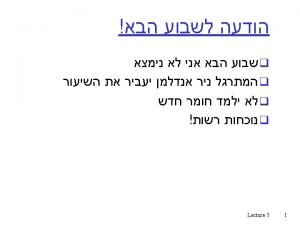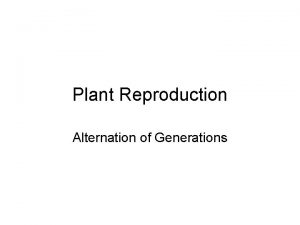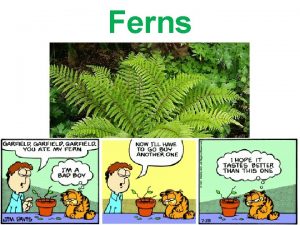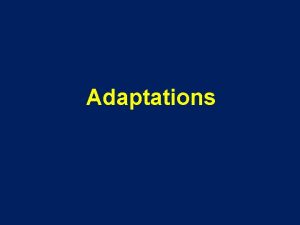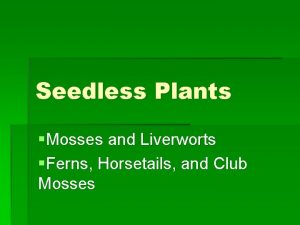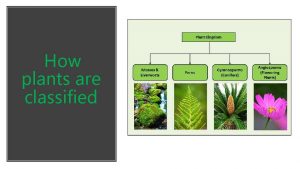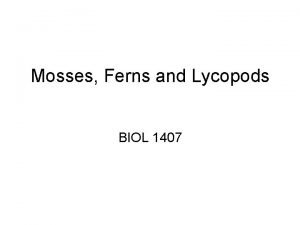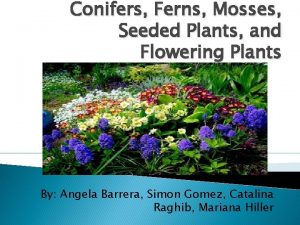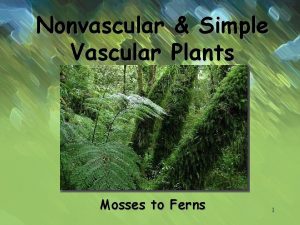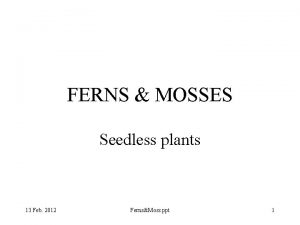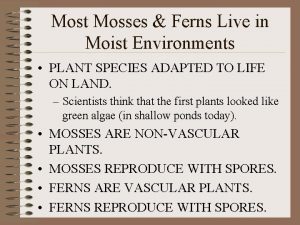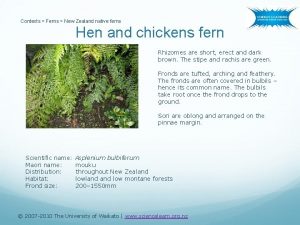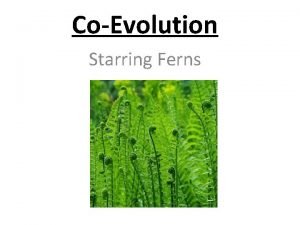Terrestrial adaptations Mosses and Ferns Alternation of Generations




































- Slides: 36



Terrestrial adaptations Mosses and Ferns Alternation of Generations Gymnosperms Angiosperms Misc. $200 $200 $400 $400 $600 $600 $800 $800 $1000 $1000

Final Jeopardy Vocabulary

Final Jeopardy • • Aquatic to terrestrial Gametophyte dominance to sporophyte dominance No cuticle or stomata to presence of a cuticle & stomata No roots, leaves, or stems to presence of roots, leaves, & stems • • No vascular system to presence of vascular system Requirement of water for reproduction to no requirement • Spores to seeds (& spores) • Development of fruit List 5 ways in which plants have become more complex

$200 • Roots - Absorb water/nutrients & anchor plant • Stems - Support & connects roots to leaves • Leaves - photosynthesize Function of roots, stems, & leaves

$400 Cuticle Waxy leaf covering that helps prevents water loss

$600 Stomata Microscopic pores that exchange gases & help prevent water loss

$800 Xylem – move water & minerals Phloem – distribute products of p/s Two types of vascular tissue & what they do

$1000 - Hold itself up (support) Get water & nutrients from soil Move water & nutrients throughout plant Avoid water loss Maintain gas exchange balance Reproduce without water Survive changing conditions List 4 challenges to life on land?

$200 1. Bryophyta 2. Tracheophyta 1. Mosses’ phylum 2. Fern’s phylum

$400 • Primary producer (provide food for other organisms and create oxygen) • Pioneer species Ecological Roles

$600 sporangium sporophyte seta leaflets gametophyte rhizoids Label

$800 leaflet frond stipe rhizome roots Label

$1000 Mosses have • No connective tissue • No cuticle • No roots …. . while ferns do Why mosses are dependent on water while ferns are considered “true land plants”?

$200 Gametophyte (haploid generation) What spores develop into and whether it is haploid/diploid generation?

$400 Sporophyte (diploid generation) What does the zygote develops into and whether it is a haploid/diploid generation?

$600 Pistil #4 stigma #5 style #6 ovary Female reproductive structure and its parts

$800 Sporophyte producing spores When meiosis occurs

$1000 One sperm nucleus fuses with egg nucleus One sperm nucleus fuses with 2 polar nuclei to produce endosperm (provides nourishment for developing embryo) Explain double fertilization

$200 “Naked” on the cone’s scale Location of gymnosperm seeds

$400 wind How pollen (male gametophyte) is dispersed

$600 • Less surface area • Waxy cuticle Why needles are resistant to water loss

$800 • Provides support so plant can grown large; reach sunlight • Conducts water/nutrients from soil and sugars from photosynthesis throughout plant Advantages of vascular tissue

$1000 • Seeds (provide protection & nourishment; can be dormant) • Small gametophyte generation dependent on sporophyte (so no longer tied to water) Evolutionary advancements seen in gymnosperms

$200 Sepal (tepal if same colour as petals) #10

$400 Cotyledons Seed leaves

$600 moths Pollinator attracted to white flowers with intense scent

$800 Dicots Net-like leaf veins, taproots, & flower parts in multiples of 4/5

$1000 • Fruit (develops from ovary; protects seed and provides nourishment for developing embryo) • Flowers (specialized reproductive structures that protect seed with an ovary) • Vector pollination and seed dispersal (more efficient) Evolutionary advancements of angiosperms

$200 • Wind • Vector 2 methods of pollination in angiosperms

$400 • By fruit consumption • By barbs • Water • Wind • explosion 5 methods of seed dispersal in angiosperms

$600 • More distance between plants means less competition for resources • Potential to colonize new environments Advantages of seed dispersal

$800 Moss – gametophyte (sporophyte dependent) Ferns – sporophyte (gametophyte independent – prothallus) Gymnosperms and angiosperms – sporophyte (gametophyte dependent) Describe the evolutionary trend seen regarding dominant generation within K. Plantae

$1000 • Can become dormant to survive unfavourable conditions • Provide food for embryo • Protects embryo Reasons that seeds are advantageous

The Jeopardy Champion!
 Fern life cycle
Fern life cycle Plant life cycles and alternation of generations
Plant life cycles and alternation of generations Alternation of generations in plants
Alternation of generations in plants Alternation of generations
Alternation of generations Alternation of generations
Alternation of generations Disadvantages of fern plant
Disadvantages of fern plant Is moss flowering
Is moss flowering Mosses ferns conifers and flowering plants
Mosses ferns conifers and flowering plants Mosses and ferns
Mosses and ferns Vascular and nonvascular plants
Vascular and nonvascular plants Phylum polypodiophyta
Phylum polypodiophyta Liverworts seedless
Liverworts seedless Cladogram of five indoor plants
Cladogram of five indoor plants Ferns adaptations
Ferns adaptations Ferns structure
Ferns structure The are seedless vascular plants with hollow jointed stems.
The are seedless vascular plants with hollow jointed stems. Mosses and their relatives are generally called
Mosses and their relatives are generally called Ectocarpus
Ectocarpus Strict alternation
Strict alternation Busy waiting
Busy waiting Phonological alternation examples
Phonological alternation examples Alternation in phonology
Alternation in phonology Alternation theorem in dsp
Alternation theorem in dsp Metafora air tenang
Metafora air tenang Coral life cycle
Coral life cycle Single character alternation in regexp
Single character alternation in regexp A plant's life cycle alternates between and generations.
A plant's life cycle alternates between and generations. Terrestrial plant
Terrestrial plant Aquatic vs terrestrial
Aquatic vs terrestrial Microphyll vs megaphyll
Microphyll vs megaphyll Ferns and algae kingdom
Ferns and algae kingdom Non flowering plants characteristics
Non flowering plants characteristics Sphenophyta examples
Sphenophyta examples Heterosporous vs homosporous
Heterosporous vs homosporous Which organism is an autotroph
Which organism is an autotroph Todays generations
Todays generations Types of switching
Types of switching
